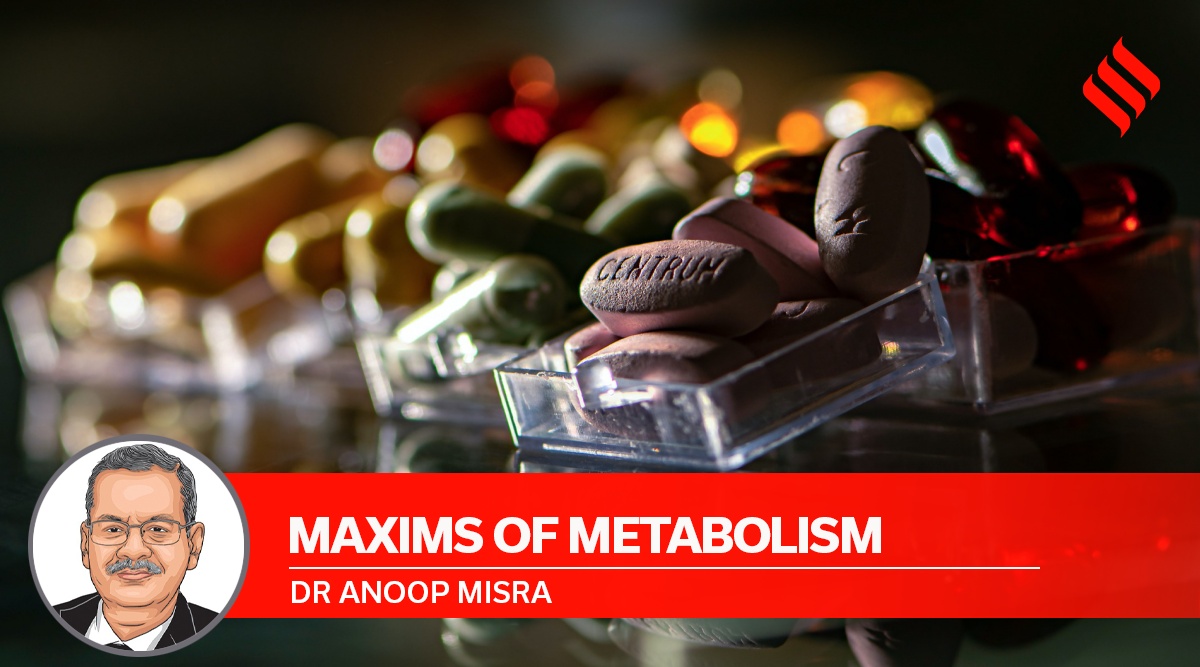A 60-year-old man came to see me about his loss of appetite. Upon questioning him, he showed me a list of 17 supplements (written on a worn piece of paper) that he was taking. These ranged from vitamins, hormones, and even steroids. He said that he just wanted to live longer than others by consuming these “energy-giving supplements.” Investigations revealed a frayed liver (high liver enzymes indicating liver damage) while urine showed high protein (indicating kidney damage). I told him, “By consuming this dangerous cocktail of supplements and hormones, you may live less than others.” I discontinued all supplements from him and his liver and kidneys gradually healed.
Another patient came to me with very high calcium levels, leading to kidney failure. When questioned, he said, “I had heard that we all have vitamin D deficiency, so I started taking it daily.” He bought it over the counter and, without a doctor’s advice, took one sachet of 60,000 units of vitamin D daily for three months (meant to be taken once a week for a limited time in people with vitamin D deficiency ). He had to be admitted and we were able to lower his calcium levels gradually. And his kidney function improved.
Do you really need vitamins and supplements?
Both cases were examples of the types of vitamin and supplement misuse. The lesson is that you don’t need vitamins and minerals if you don’t have any disease. Regular exercise and a nutritious diet, including plenty of fruits and vegetables, should do the trick. Sufficient vitamins/minerals can be acquired from the following sources: vitamin D from sun exposure, calcium from milk, curd, cheese, etc., B12 from liver and shellfish, while protein can be obtained from non-vegetarian sources , soy, milk, nuts. , Bengal gram, lentils and flax seeds.
Dietary supplements are available in pure (eg, vitamin B12, fish oil, vitamin D, whey protein, etc.) and blended forms (multivitamins include anywhere from 30 or more vitamins and minerals together) . The latter is widely consumed.
When do you need supplements?
A patient should be guided by a doctor or nutritionist. When food absorption is decreased in the intestine (malabsorption, pancreatic inflammation, or intestinal surgery), several vitamins become deficient. Patients who have lost a lot of weight (cancer, liver diseases, etc.) will require vitamin and protein supplements. Those who drink a considerable amount of alcohol for long periods become vitamin deficient. People with brittle bones and thin muscles require vitamin, calcium, and protein supplements. Iron supplements are necessary in several conditions: heavy periods in women, intestinal ulcers, worm infestations, etc.
Remember, multiple vitamin and protein deficiencies can occur after any acute infection (viral, bacterial) and have been seen to occur severely in people with COVID-19 infections. Pregnant women clearly need vitamins to prevent birth defects from occurring in their offspring. Some vegetarians may be deficient in vitamin B12 and protein. For those going through the process of alcohol withdrawal, thiamine supplementation becomes necessary.
Diabetes patients are often prescribed multivitamins. Those taking the commonly prescribed drug metformin will need vitamin B12. People with long-standing diabetes, who are frail and have poor appetite or intestinal muscle dysfunction (due to severe nerve damage) will need multivitamin and vitamin D supplementation. Protein supplements should be given very carefully in patients with kidney dysfunction. Diabetes patients often have elevated levels of fats in the blood (“triglycerides”) and these can be effectively treated with fish oil capsules (made from the oils of salmon and other fatty fish).
The gym alert
Young men who want to build their muscles are given protein supplements in gyms. These can help. However, the dose of total protein intake must be correctly calculated according to body weight. Other additions such as body building hormones (anabolic steroids) should be avoided. These supplements are given in many gyms by unqualified people.
As well as excess vitamin D (see the second patient above) and calcium, intake of some other vitamins can also cause harm. Avoid beta-carotene (from pills, but okay from natural foods) if you are a current/ex-smoker, and vitamin A if you are pregnant. Excess vitamin E taken over long periods can increase the risk of prostate cancer.
A multivitamin will not serve the purpose.
Some people think that if they take a multivitamin tablet, they will have enough of all the vitamins and minerals. That is not true. Specific vitamin/mineral deficiencies (vitamin B12, folate, calcium, iron, vitamin D, etc.) should be treated with pure specific vitamins/minerals (personalized therapy) given at doses 5 to 10 times higher than those prescribed. are found in a multivitamin capsule. Tablet. In case of severe deficiency, it is necessary to administer injectable vitamins.
Finally, there is the misconception that taking vitamins/minerals daily will prevent heart disease or cancer. There is no evidence that this happens in those who eat a variety of healthy diets, fruits and vegetables, and get out in the sunlight for aerobic exercise. Clearly, a daily multivitamin cannot replace a healthy diet and exercise.
(The author is a Padma Shree Award winner and author of the book “Diabetes with Delight”)
!function(f,b,e,v,n,t,s)
{if(f.fbq)return;n=f.fbq=function(){n.callMethod?
n.callMethod.apply(n,arguments):n.queue.push(arguments)};
if(!f._fbq)f._fbq=n;n.push=n;n.loaded=!0;n.version=’2.0′;
n.queue=[];t=b.createElement(e);t.async=!0;
t.src=v;s=b.getElementsByTagName(e)[0];
s.parentNode.insertBefore(t,s)}(window, document,’script’,
‘https://connect.facebook.net/en_US/fbevents.js’);
fbq(‘init’, ‘444470064056909’);
fbq(‘track’, ‘PageView’);
.
